Blogs
Practical Insights & Latest Happenings
Don’t miss out on the latest trends and info on SEO, search engines, social media, and more.
January 3, 2024
mothasim

Niche research is a must for a business that aims to understand customer needs, identify opportunities, craft your marketing strategy, and dominate a specific market segment with authority and credibility.
But how to do niche research that results in long-term success. This is what this guide is about.
Here we shared a simplified way to go about the process that anybody can follow!
A niche market is a small section of a larger market that caters to a more specific target audience. Customers of a niche market usually look for a specific solution within a broader niche and so the concept of niche market was born to attend to their needs.
If you are in charge of a niche market, you have to focus on your target audience and customize your product line accordingly.
For example, sports equipment is a broad niche. For every sport, several more niches open up e.g. football equipment, tennis kit, basketball gear, and so on. These niches can further be broken down into sub-niches e.g. football jerseys, tennis shoes, basketball wristbands and headbands, and more.
Let’s say, the parents in your area are concerned about their children getting injured when playing with adult tennis equipment. So, you can now come up with a solution to this issue and start selling tennis kits designed only for kids. The safer equipment such as smaller rackets, colorful balls, and so on will make sure your customer base is satisfied and you have a healthy business.
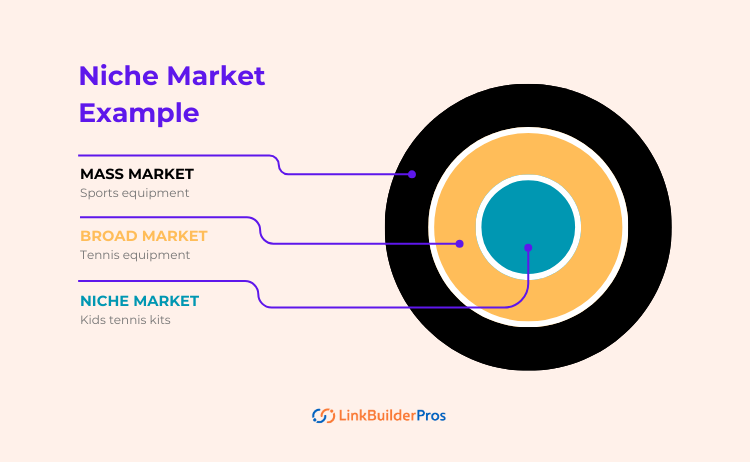
We’ll come to how you can conduct niche research easily in the following sections. First, let’s look at why it’s so necessary for a new business.
Once you know how to do profitable niche research, you might find some less competitive and even totally untapped areas that you can exploit and build your business on. If you’re a start-up on a budget, these opportunities are priceless for sure.
Try to stand out from the crowd. Look for creative ideas that no one has thought of. This opportunity will allow you to separate yourself from the generic broad market solutions and gain expertise in a more specific service.
The research will help establish your brand as an authority figure in the niche.
By researching your niche, you can always stay one step ahead of your user demands and competitors. Analyze every move and see how your customers respond. You can optimize your business this way and define your target market and target audience clearly.
In the last example, kids are your target market and their parents are the target audience.
Once you start researching, you’ll understand how to create content that satisfies user demand, achieves more user engagement, and earns you a steady profit.
This is all about matching user intent as we have discussed below.
In short, you learn what works and what doesn’t in your niche. Based on that, you can make conscious decisions and tailor your product for maximized content marketing.
A business is not exactly a hobby. You need to sustain your services throughout to keep going and make sure you have a steady flow of cash coming in. A niche has to be evergreen and this is what one looks like-
Your services need to be in demand all the time. If you have outdated products, replace them with modified or new stuff. Make sure you have the necessary skills to adjust to any challenging situation during your business tenure.
Stay open-minded and hungry. Don’t become too content with your success anytime soon. Good times may not last for long. If you are a tennis kit vendor now, see how you can expand your niche even more into a sports equipment one. Dream big and work well to stay relevant.
Since you’re giving your customers exactly what they want, they will always prioritize you over your big competitors. This guarantees long-term growth for your business.
You’re not a merchant of generic products here. This shows that you have unmatched skills and expertise in your niche. People will turn to you in times of need and you get to position yourself as an authority figure with your brand.
You may have a small audience at first but that only means fewer competitors to fight with. Make the best out of this time bracket for a quick profit.
So, how to do niche market research? Follow this step-by-step guide and you will get it done in no time!
The smartest way to start niche research is to have a clear idea about what you want to do.
If you are not sure about your goal in the first place, don’t expect to do well with the startup anytime soon!
Set some realistic goals right away. Analyze your strengths and weaknesses. Be prepared for setbacks and then pick a niche that makes sense.
If you are looking for immediate profit, choose a niche that’s profitable at the time.
If you are in it for the long haul, do something that keeps your content evergreen.
Some go for niche research only to understand the market trends and competitors’ strategies. If you have some short-term plans like this, tailor your campaign that way.
“If you are good at something, don’t do it for free” – this famous quote works better in the business world than movies and you should go by this when starting a business.
If you have an unreal amount of knowledge and expertise about something, say – the home automation system, you can make your choice easily.
The advantage of starting with a known niche is that you can predict your growth as well as outsmart your competitors who are in it just for the money. This is because you have a special connection to the work you’re doing and you understand your audience better.
But that isn’t always the case because what you love to do doesn’t always pay. When a prospect is not looking profitable in the long run, you shouldn’t go after it no matter how good you are at it.
List all the known and unknown niches that make sense to you and start narrowing them down based on a number of factors like-
If you’re not sure of the idea yet, explore a little bit!
The easiest way to find niche ideas is by scrolling through Wikipedia. It sounds a bit unconventional but that’s an effective trick if you’re just starting.
If you are interested in the home automation system, search it on Wiki and read through it.

Home automation here is a broad niche. When you read the content, you’ll get many ideas about different types of home automation devices.

Every type listed under Applications and Technologies can be a sub-niche for you here. Some of them are clickable. This means Wiki contains separate content on them. If you click through, you’ll get more sub-niches down the line.
It’s even simpler than Wikipedia if you know this trick.
Just go to Google and only type in the main niche. The drop-down menu will suggest some more sub-niches you can choose from.
So, if you pick voice control from the automation system, you can niche down like this –

Here you can get some solid ideas from just pasting ‘voice control’ in Google. You can jump to Voice Control TV and start analyzing the market for it.
If you want a more effortless way to get your ideas, online marketplaces can help. They give you even more depth into the sub-niches since all they contain is product information on their sites.
So, open one of the reputable online marketplaces like Alibaba in this example and type in your niche.

You will see loads of ideas from the drop-down alone. When you search away, the next page will contain more and you can pick your sub-niche based on how affordable and profitable the business looks in the long term.
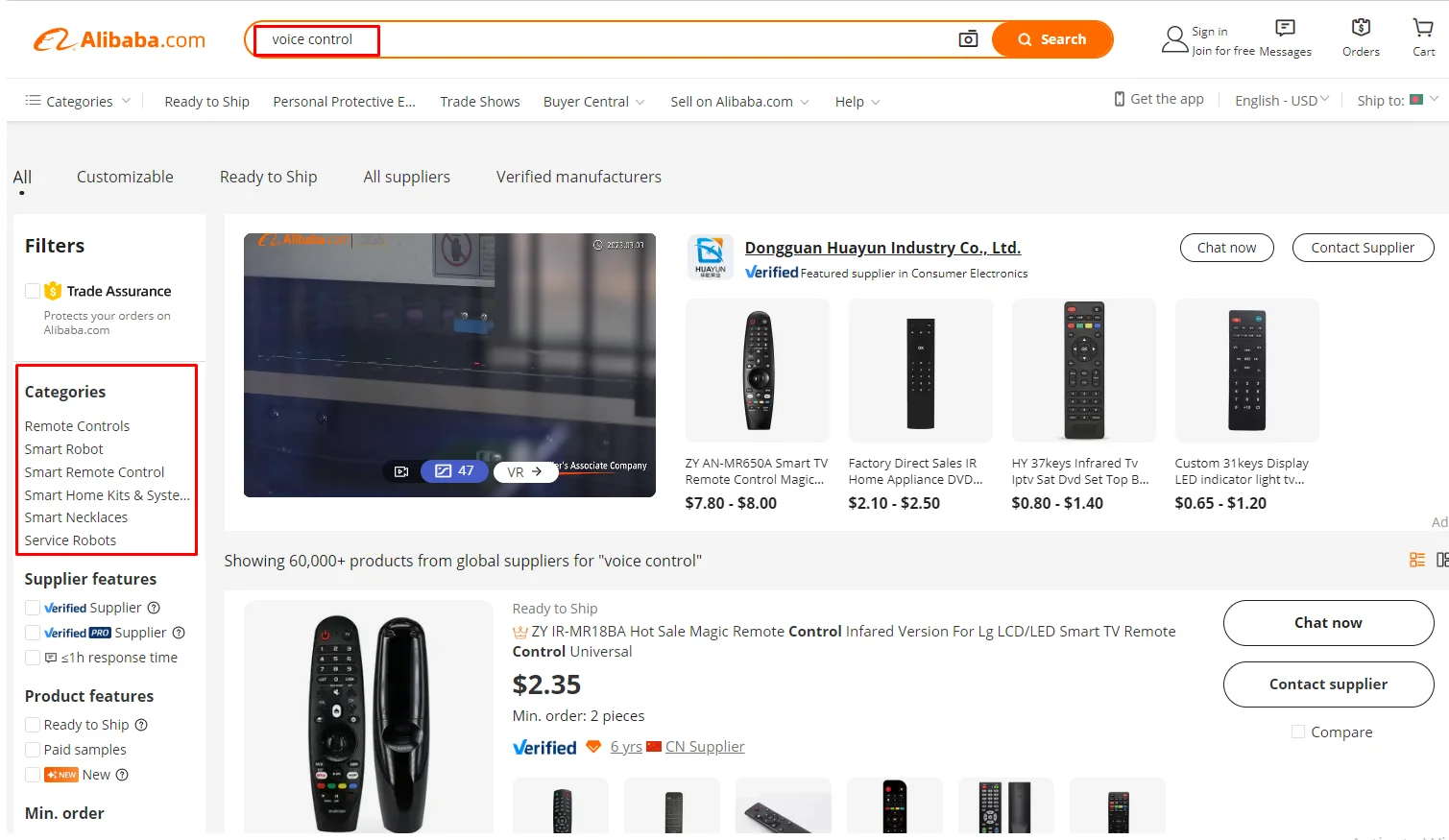
You can use Google Trends to figure out the trending topics and use them as your niche if possible.
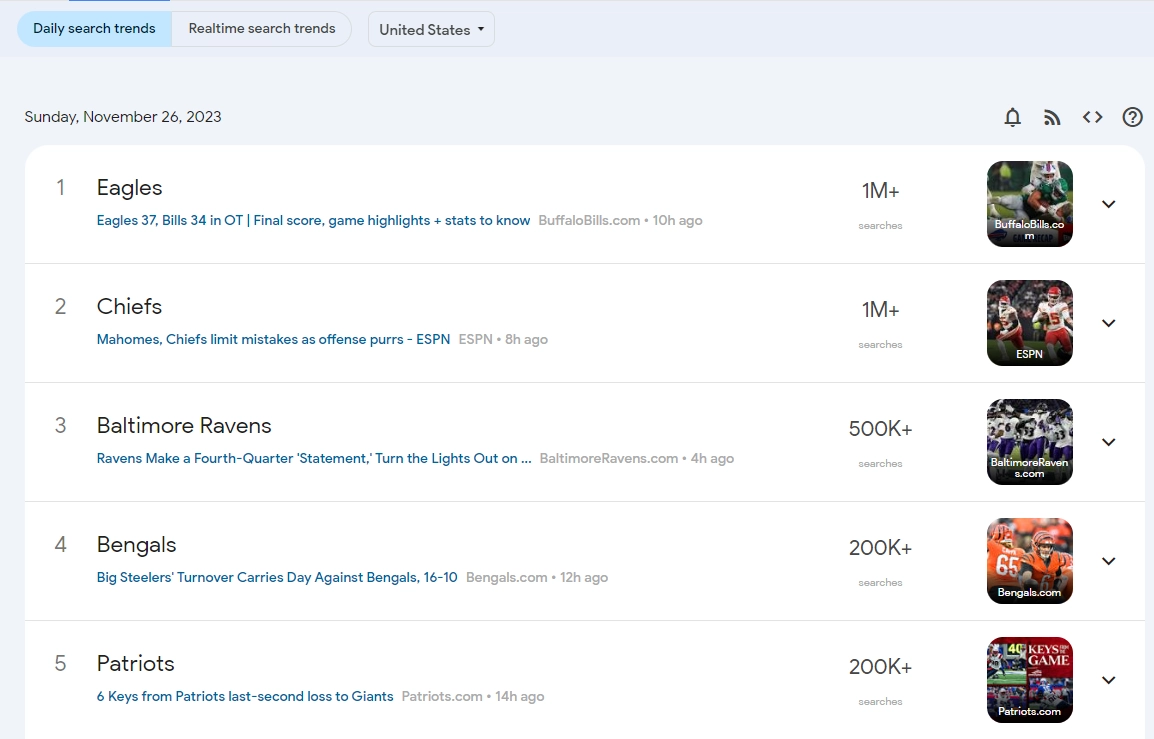
However, if you’ve already picked what niche you want to be a part of, you can use a fascinating feature called ‘Explore’ in Google Trends as well.
Just type in a keyword or a broad term for the niche you choose, in this case, “voice control” and start analyzing. You can see a graphical representation that shows the interest of people in the niche. The map below filters that interest by geographical sub-regions.

Towards the bottom of the page, you get a list of sub-topics and some common queries related to your niche.
This information helps you choose the right sub-niche for your business. You can use filters to see which topics or queries are on the rise and hop on that hype train for your startup!

Narrow down your topics of interest like this and compare them using the ‘Compare’ feature to finalize your niche.
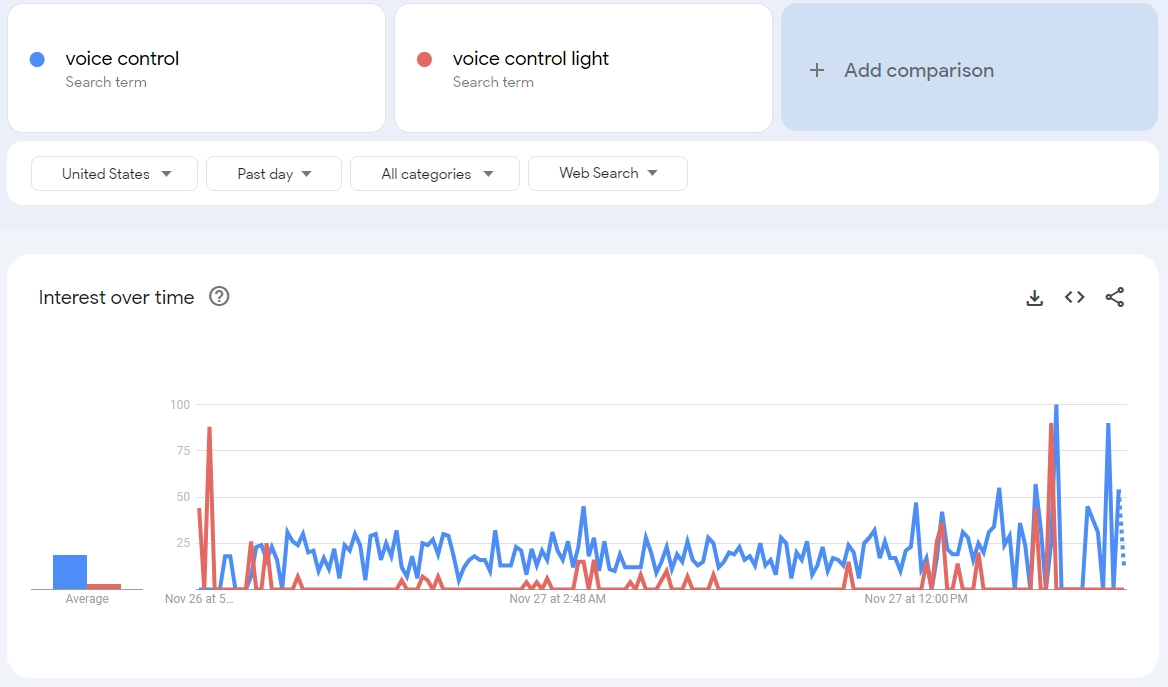
Ahrefs is a popular SEO tool that you can use to analyze niche trends as well.
Ahrefs allows you to search with no keyword at all. The result is a massive list of top-ranked keywords in a particular location.
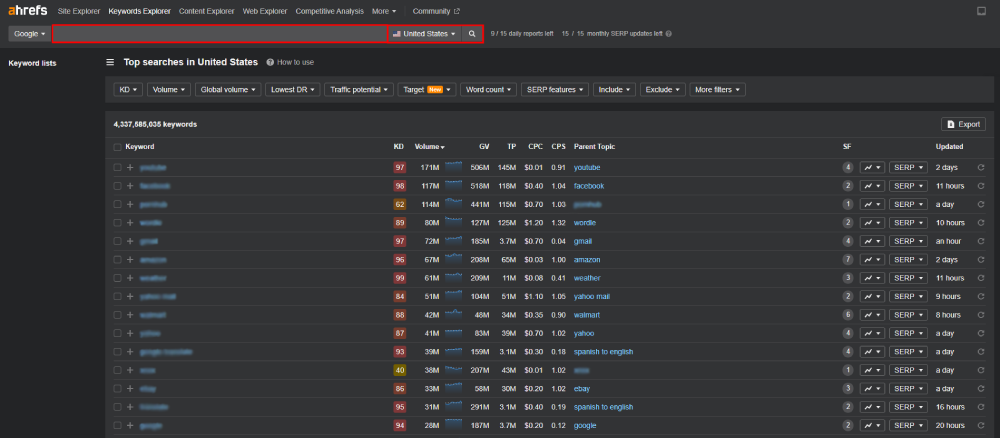
You should filter the result by low keyword difficulties (KD) and high volume because these are the keywords you have a chance to rank for organically. In this example, we’ve set the KD to 0-10% and Traffic Potential to at least 1M.

Use other filters to narrow down your search as much as possible. For example, you can use the ‘Include’ filter to type in related keywords if you have a specific topic in mind and the ‘Exclude’ filter to leave out keywords with a specific name you don’t want to work with.
Finally, find out which one of the refined keywords aligns with your business goal most and analyze it further.
Click on the Parent Topic that the keyword belongs to and you’ll see an overview of the topic in the very next window. We’ll delve more into it during our keyword research step.

Your niche competitors are those with the same business goals and target audience in mind as yours. When learning how to do niche research, it’s important to find your competitors and research them well enough before building your strategies.
Check out our detailed article on how to do competitor analysis in SEO (internal links) that you can read. We will discuss in short here –
A simple Google search with a keyword you’re hoping to rank for is enough to figure out who you’re competing against.
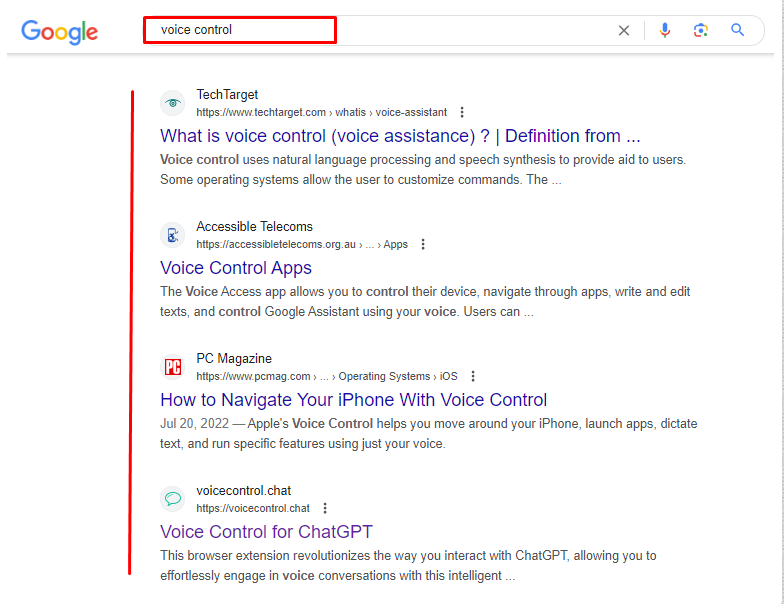
However, if you feel like going more formal in approach, try SEMRush- an SEO tool.
Just go to the “Organic Research” feature of SEMRush and paste your domain link. Take voicecontrol as an example-

Navigate to the ‘Competitors’ tab and see the list of organic competitors.

Organic competitors usually rank at the top of the SERP. Now, you can look into any of the websites you want. Let’s say you want to see what the topmost competitor walmart.com is doing to outrank you. Just click on the domain.
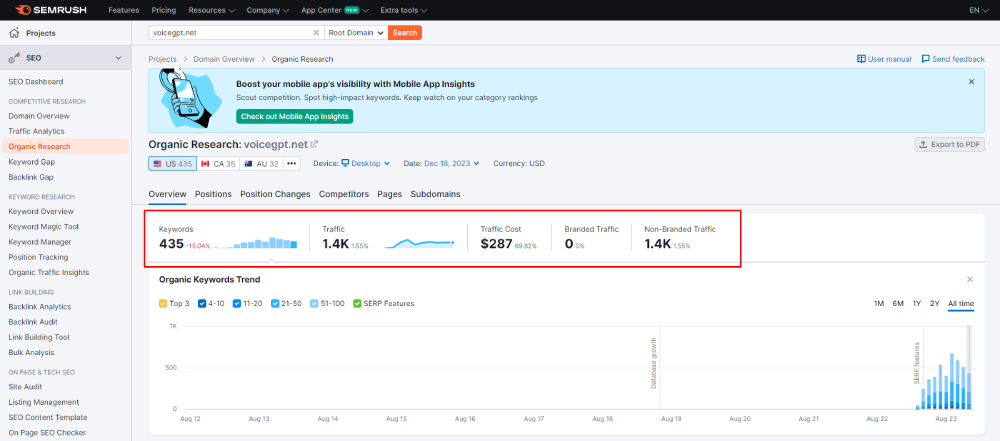
When analyzing competitors, you should focus on their –
Another important aspect is their backlink profile. To check it out, you should navigate to the Backlink analytics tool and list out the authoritative referring domains they’re getting their backlinks from for a primary idea.

You have to put in some manual effort as well. Content quality of your competitors is something you should definitely look at when stalking your rivals and that can’t be done using SEO tools.
While you’re at it, try to get an idea about how they designed the websites as well. Ask some essential questions-
How to do niche keyword research? Niche keywords are specific keywords relevant to a particular niche. They are usually long-tail keywords to narrow down the search results for users to find exactly what they’re looking for.
Following our earlier example, if those guardians type in “Tennis kits” on search engines, they’re not going to get what they want. That’s because the keyword is too general and a lot of companies will be targeting the same keyword.
But if they search for “Kids tennis kits in [their area name]”, that should help.
You have a great chance to rank for this particular keyword since you’re providing the services in your area. All you need is a little bit of research and tailor the niche keyword to your advantage.
So, how do we do the research?
Use tools like Ahrefs or Ubersuggest where you can do extensive keyword research from a couple of clicks.
Let’s go with Ahrefs Keyword Explorer tool today.
If you picked your niche topic as “voice control”, input the topic in the Keyword Explorer tool.
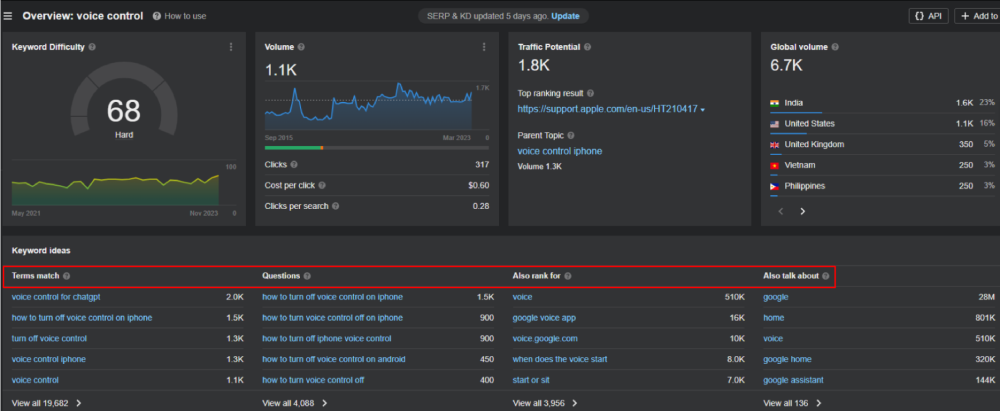
From this page, you see the keyword difficulty and traffic potential of the topic data. You will also see loads of keyword ideas here under the tabs – “Terms match,” “Question,” “Also rank for,” and “Also talk about.” They reveal exact or partial matches to your keyword and what people usually look for in search engines using them.
You can dive deeper by exploring the ‘Terms match’ and navigating the list of all related keywords to your niche. The list will help you gather more topic ideas for your niche.

Filter the search results by tweaking the KD and Traffic Potential filters. The lower the KD and higher the TP, the better your chances to rank for those keywords.
However, don’t get your hopes up as a startup. You should be realistic when targeting keywords for your niche. Since you’re just starting, you can’t hope to rank for high-volume keywords just yet. You have to gradually build your website authority for that.
Let’s adjust your search with a maximum KD of 10% and a maximum volume of 250 for now.
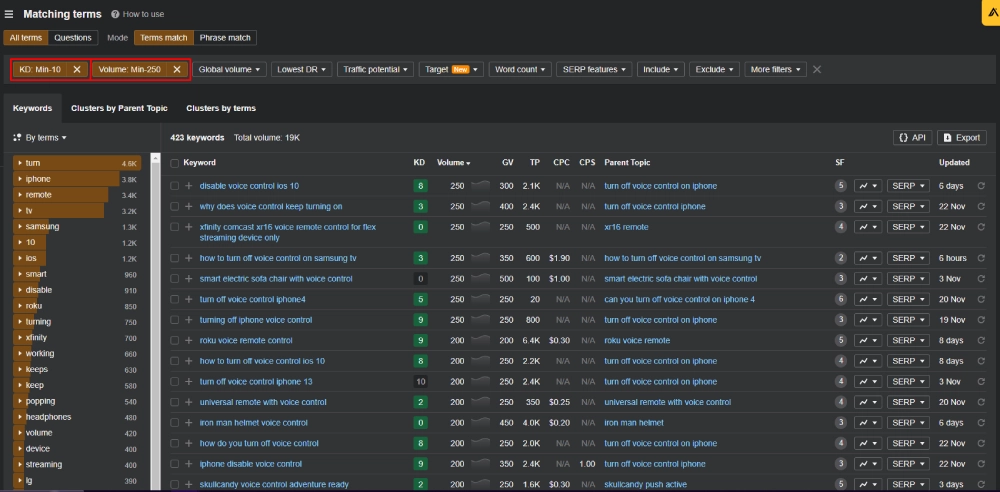
Once you’ve slowly generated enough traffic, you can always go back and change your filters to aim for keywords with increased search volumes. The key is to stay consistent and alert.
Remember, whatever you do, your keywords have to reflect user intent. If you design your low-tail keywords based on data from the tools alone but nobody searches for it, then that’s a shame, don’t you think?
So, always prioritize what your users need over what the numbers say. But how? Let’s look at some of the hacks you can follow to understand your users’ psychology.
To meet user demand, you need to realize how keywords vary depending on user intent first.
Based on intent, keywords can be categorized into 4 classes-
You need to organize your keywords according to what your target audience is looking for.
Are you providing services or selling products? If yes, then you have to group commercial and transactional keywords in abundance.
Sometimes, you might have to group unrelated keywords to create a balanced website.
Say, your audience is interested in buying a new product from the market. If you want to draw them to your site, you need to provide them with an in-depth preview or review of that product.
So, you’re using informational keywords to introduce them to your services and then commercial or transactional keywords to make the sale. The chances of making a profit from this campaign go higher this way.
Question keywords clearly tell you what your users are struggling with. You easily get an idea about whether your audience is looking for information or transaction.
There are many ways to find out the question keywords. The most effective among them is Ahrefs, the tool that openly acknowledges the question keywords.
Remember the Matching terms page from the previous step where you listed out all relevant keywords for your niche? Just choose the ‘Questions’ filter and Ahrefs will list only the question keywords.
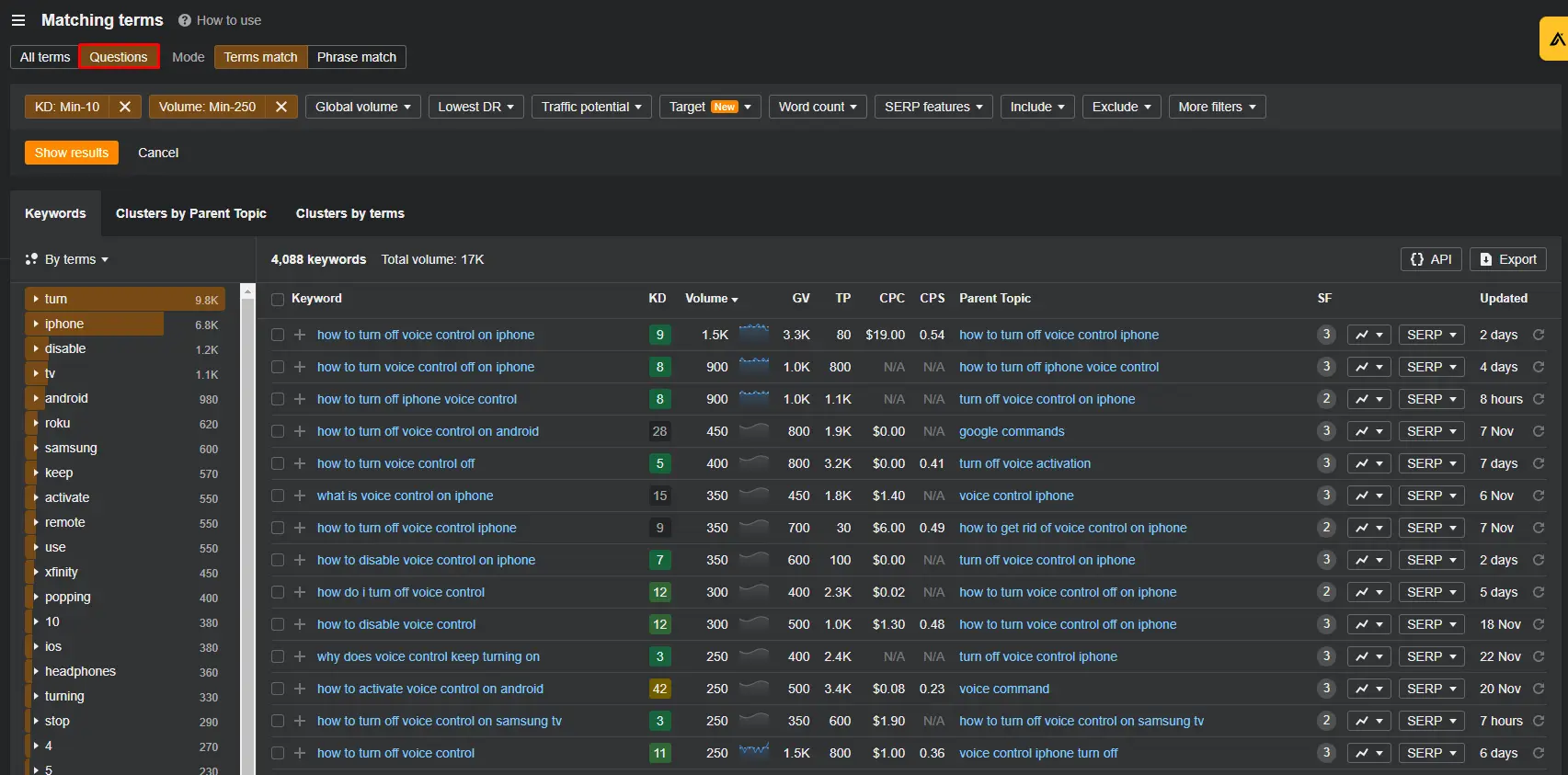
But this is not the only way. There are some manual tricks you can follow as well to figure out the intent of your niche audience.
One of them is “People also ask” section on the Google SERP. You can see what your audience frequently asks for here very easily.

If you expand on one of the questions, a couple more questions open up. This way, you can go deeper with your research.
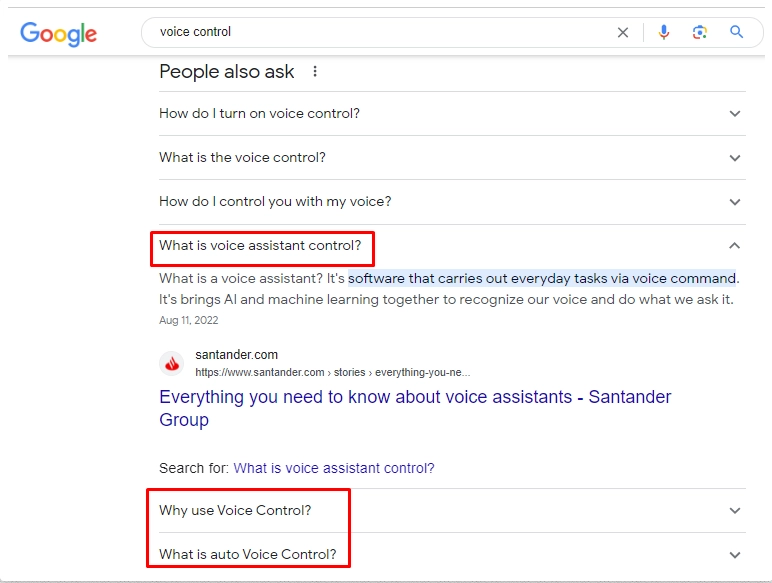
You can use the Answer The Public tool for an extensive range of questions on a single topic presented in a visually appealing way.

There are several other tools and websites you can make use of-
You’ve set up your niche, fixed your keywords, and are regularly updating your content. Now, onto the most important stuff- leveraging your insights and data to generate income.
You can monetize your niche in a number of methods. Let’s talk about the most popular ones here-
Here you promote relevant products and services from other businesses on your site and earn some decent commission.
This is not exactly a scheme for making easy money. Affiliate marketing needs hard work and persistence. However, if done right, you can monetize your niche site with some passive income.
The simple thing to remember is that your niche audience has to be the same as the target group of the affiliate websites. Otherwise, the entire campaign will go in vain. You should identify the products you’re about to market with more accuracy and strategize accordingly.
This one is a more modern approach to taking advantage of the advertising industry.
When you strategically place ads on your website, for example, in banners or visuals, and the target audience keeps clicking on them, advertisers offer you an additional commission from out of their revenues.
To make this campaign a success, you have to partner up with reputable advertisement agencies and effectively represent their ads on your site so they reach the target demographics.
You can also use platforms like Google Adsense and Ezoic for ad revenue.
Not satisfied with the stuff so far? Well, if you want big money, you have to work for it.
Produce some digital products that are in demand at the time. The key is to understand your audience and what they’re looking for.
Generate some creative ideas and convert them into sustainable products. For example, you can produce toolkits relevant to your niche and sell them to users at a reasonable price. The buy rate will make sure you’re making revenues soon enough.
If you want a wider customer base, you can sign up on Etsy – a digital marketplace where you can start your side business today!
If you have an established audience and authority, many businesses might want to form partnerships with you so they can post promotional stuff on your site. You will be compensated for the posts and in return, you will help them increase their brand awareness and drive organic traffic to their sites.
However, you should only pair with sponsors whose business goals and target audience align with yours. Otherwise, your audience might lose trust in your product.
You can negotiate the terms directly with the sponsors or use platforms like IZEA and GrapeVine Logic to manage the collaboration.
Offer exclusive services to a portion of your loyal customers by creating different membership sites like Patreon, Memberful, and even WordPress plugins like MemberPress. Charge a subscription fee or a range of packages for accessing different services.
On one hand, you get a little extra income on the side and on the other, you hold on to your most dedicated customers. The only condition – provide services worthy of a premium version. Make them see your point.
Now is the time to calculate your return on investment. Mind you- ROI can be both quantitative and qualitative.
Quantitative ROI is what we traditionally take into account for niche marketing. This is because it’s measurable and a standard practice in businesses. We speak in financial terms in this case as we evaluate our gains and savings against the initial investments.
Quantitative ROI= (Return on Niche Research – Costs of Niche Research)/Costs of Niche Research
So, if you invested $50,000 in your niche and earned back $100,000 by the end of the year, your ROI would be 100% or 1 – meaning you have covered your investments and made a profit of the same amount on top of that.
However, qualitative ROI is different and can’t be spelled in numbers. It’s all about a holistic picture of your business experience and how your investment has given back in non-financial terms. So, after your research, your quantitative ROI focuses on things like-
You need to estimate both quantitative and qualitative ROI for your campaigns to determine the best practices going forward in today’s market.
Although a little tough, if you know how to do niche research right then it can be the gateway for you to become the next tycoon in your industry! Here are some tips if you don’t know them already:
Do what is of interest to you and try not to stop midway.
Well, the solvable ones at least! Don’t become just another generic content creator on the web. Be a source of reliable solutions to trending issues in your niche and build trust with your expertise.
Study your audience and create an ideal persona based on their preferences, demands, pain points, and demographics. Cater to the users by tailoring your content to their demands.
Regularly conduct competitive analysis and be aware of your SERP positioning. Analyze why your competitors are ranking better than others.
Checking where your competitors are receiving backlinks from is an amazing way to identify referral domains for your niche.
Focus on your topical cluster and try to increase its value compared to your competitors.
Making numerous blogs and content doesn’t guarantee anything if you’re not adding any value. Plan your content and services in the best way possible.
Constantly highlight your brand in your content, services, and partnerships.
SEO is instrumental in your success. So, develop a mind and if possible, a team to optimize your on-page, off-page, and technical SEO when structuring your niche.
Always stick to the analytical aspects of your data and research. Look out for the latest in the market and how the audience is perceiving you to strategize further.
Related Article: How to Choose Between Niche Edits and Guest Posts?
Niche research is a lengthy process even with professionals in place. If you can’t make time for your niche research as a businessman, you can appoint an SEO agency for the smooth handling of the job.
We at LinkBuilderPros have been building niche sites for our clients all around the globe. Our team of SEO and content marketing experts has built quite a reputation that you can rely on for any SEO and link building issues including niche research. Reach out to us if you have been struggling with your niche research campaigns. Our proven track records speak for themselves and soon enough you’ll be our priority!
Niche research is a precondition for building a successful business niche
This blog covers how you can take a step towards the right direction.
Don’t give in to desperation or excitement when choosing your niche. Analyze every aspect of it and make a smart choice. Make use of tools and tricks we have informed you of and be confident in your approach.
If you are not a professional, turn to experts for competitive analysis, keyword research, and matching user intent for your niche.
All in all, you have to invest a considerable amount of time, money, and effort into research if you want to make your niche a success. Stay patient and enjoy a smooth ride with your new endeavor. Good luck!
Q. How can I test the viability of a niche before fully committing?
Ans. Launch a pilot project before a small audience and assess their feedback. Monitor how well it works financially and base your next decision on the overall results.
Q. Should I consider global or local niches?
Ans. It depends on your business goals. If you want lesser competition but consistent traffic, local niche is the way to go. Global niches on the other hand are more scalable and can help you expand better.
Q. Can I adapt an existing product/service to fit a niche?
Ans. Yes, it’s a common practice to adjust the use of an existing product to the needs of a new niche. However, in that case, you need to be very aware of your audience and their changing demands to be able to cater to them.
Q. How can I stay updated on niche trends?
Ans. It’s recommended to follow up on new publications, subscribe to newsletters, and attend conferences related to your niche to keep up with the latest trends and adapt your strategies accordingly.
Q: What role does social media play in niche research?
Ans. Social media is a good enough medium to analyze your audience demographics, engagement, and preferences. The more you engage your audience on social media, the better you understand their behavior towards your product and carry out your content marketing campaign accordingly.
Q: What are common pitfalls to avoid in niche research?
Ans. A couple of mistakes you should steer clear of- choosing a niche based on passion without any consideration for its economic growth, overlooking competition, irregularity in updates with modern trends, failing to assess market demand, and so on.